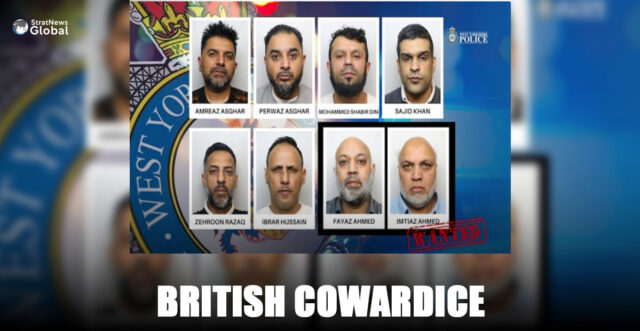For years, Britain’s political and policing establishment refused to confront one of the most disturbing patterns in modern criminal history: the organised sexual abuse of vulnerable young girls by grooming gangs made up disproportionately of men of Pakistani heritage.
The evidence was there. The warnings were there. But action wasn’t—because truth had become less important than optics.
That changed June 16 when Baroness Louise Casey published a scathing report, commissioned earlier this year by Prime Minister Keir Starmer, exposing how police and officials repeatedly failed to investigate or prosecute gang-based child sexual exploitation for fear of being seen as racist.
“There has been too much denial, too much victim blaming, and not enough cultural or community engagement to challenge harmful attitudes and behaviour,” wrote Casey.
Her findings confirmed what survivors and whistleblowers have said for more than a decade: that cultural sensitivities, bureaucratic inertia, and political cowardice allowed predators to operate with near impunity in towns like Rotherham, Rochdale, Telford, and Oxford.
This wasn’t just about flawed decision-making. It was a failure of moral clarity.
The UK government, under mounting pressure, accepted all of Casey’s recommendations and announced a long-overdue national inquiry into grooming gangs. In Parliament on June 17, Home Secretary Yvette Cooper offered a formal apology:
“There had been too much reliance on flawed data, too much denial, too little justice, too many criminals getting off, too many victims being let down.”
That admission, though welcomed, came years late. The report, as Reuters summarised, found that the UK had “failed to identify and act on a disproportionate number of men of South Asian, particularly Pakistani, heritage” who were part of group-based child sexual exploitation.
And even the phrase “South Asian” is clearly an attempt to soften the blow by spreading the blame to countries beyond Pakistan.
In other words, the very institutions responsible for protecting children chose instead to protect reputations.
In past scandals—from Rotherham to Huddersfield—internal reports repeatedly warned about cultural attitudes among some perpetrators, including misogyny, racism toward white girls, and a sense of entitlement to their bodies. But those red flags were either ignored or buried.
Why? Because identifying the ethnic makeup of these grooming gangs was deemed too controversial.
This wasn’t about data. It was about ideology. The prevailing orthodoxy in public institutions held that to acknowledge these patterns would be to fuel racism. But the real cost was paid by working-class girls, overwhelmingly white, whose abuse was dismissed or covered up.
As Al Jazeera noted, Labour leader Keir Starmer had initially resisted a full inquiry into the grooming gangs issue. but “ordered the review earlier this year amid growing pressure from political rivals and high-profile campaigners” including Elon Musk, who declared on X that “the legacy media and corrupt politicians hid this for 20 years.”
He also publicly criticised Labour’s former safeguarding minister Jess Phillips, calling her a “rape genocide apologist” and saying she “deserves to be in prison” after she opposed a public inquiry into grooming gangs.
Whether or not one agrees with Musk’s rhetoric, his intervention helped reignite public interest and pushed the issue back into national focus. Musk tapped into a sentiment many ordinary Britons have harboured for years—that the elite’s obsession with not offending communities has come at the expense of justice.
This isn’t about blaming all Pakistanis. It’s about telling the truth.
Let’s be clear: most child sexual abuse in the UK is committed by white men. But group-based exploitation, the specific type of coordinated grooming and trafficking seen in several high-profile scandals, has involved a disproportionate number of men of Pakistani heritage. That’s not a smear. That’s a statistical and documented fact—one the British state is only now prepared to acknowledge.
Baroness Casey made it clear that the fear of being labelled racist stopped authorities from acting against these grooming gangs. But the result wasn’t social harmony. It was systemic betrayal.
There was no risk of racism in naming a pattern. There was a risk, instead, of institutional decay when the truth itself became taboo.
Britain now faces a reckoning. If Casey’s report becomes just another document gathering dust—like so many before it—then the message is clear: some lives matter less than others, depending on who victimises them.
Worse, it seems increasingly likely that the very politicians, police chiefs, and bureaucrats who buried these stories, shamed the victims, and dismissed whistleblowers will walk away untouched.
No resignations, no criminal negligence charges—just belated apologies, parliamentary speeches, and photo ops with victims they once ignored.
The country cannot pretend to have learned from this unless it is willing to hold not only the abusers, but also the enablers, to account.
There is still time to change that. But it begins with rejecting the cowardice that kept the truth buried—and insisting that protecting children must always come before protecting narratives.
In a career spanning three decades and counting, Ramananda (Ram to his friends) has been the foreign editor of The Telegraph, Outlook Magazine and the New Indian Express. He helped set up rediff.com’s editorial operations in San Jose and New York, helmed sify.com, and was the founder editor of India.com.
His work has featured in national and international publications like the Al Jazeera Centre for Studies, Global Times and Ashahi Shimbun. But his one constant over all these years, he says, has been the attempt to understand rising India’s place in the world.
He can rustle up a mean salad, his oil-less pepper chicken is to die for, and all it takes is some beer and rhythm and blues to rock his soul.
Talk to him about foreign and strategic affairs, media, South Asia, China, and of course India.





